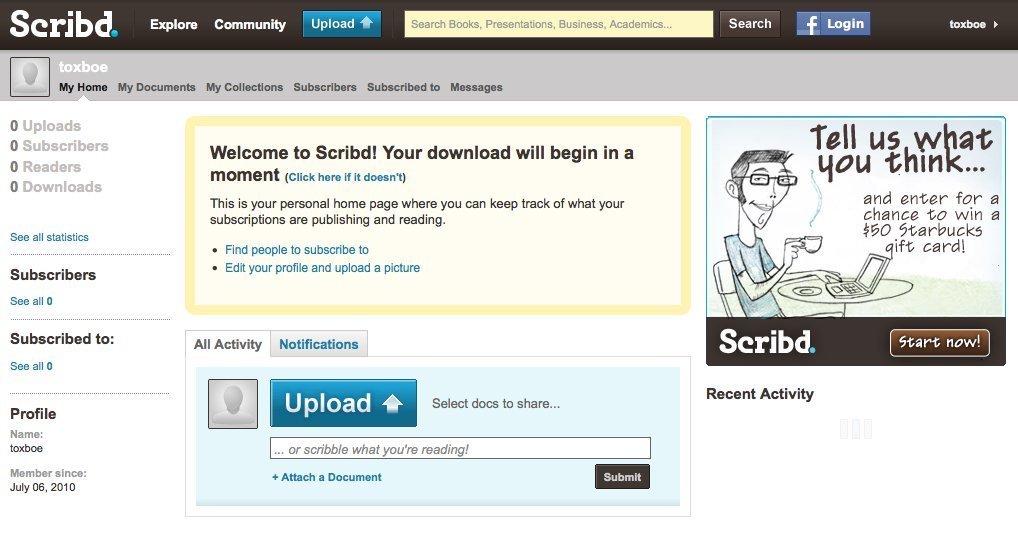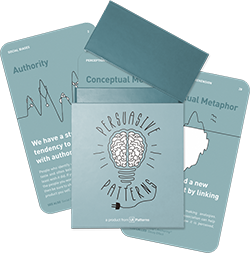Reciprocation
Design Pattern
Problem summary
We feel obliged to give when we receive
Example

▲ Right after downloading a document from scribed you are asked to share a document of your own. One favor in return for another?
Usage
- Utilize the power of reciprocation by provoking or retaliating users to returning a favor or value provided for free.
This card is part of the Persuasive Patterns printed card deck
The Persuasive Patterns Card Deck is a collection of 60 design patterns driven by psychology, presented in a manner easily referenced and used as a brainstorming tool.
Get your deck!Solution
Make users feel they have been done a favor by the system or other users in order to make them feel obliged to return it. The favor can be annything from receiving a physical gift to a hug – or even a “like” on facebook. The receiver of the gesture or favor then has the social obligation to respond, following the norm of reciprocity.
Reciprocity can also play out in a negative way: revenge. Even though revenge is a negative behavior, it has been utilized in a number of online games, where you try to “get each other”. On Foursquare, you can take over the mayorships of other people, which in turn feel obliqued to return the negative favor.
Provoke users to retaliate based on their social obligation to respond.
Rationale
If we feel we have been done a favor, we will want to return it. When we receive a gift, we are more likely to comply with the demand that follows: we say yes to those we owe.
Reciprocation is part of the norms that form our social behavior. We are raised that returning a favor is the right thing to do and that we should feel bad if we do not return a favor. Our bad conscience will at some point gather up unreturned favors into some sort or action from users.
Discussion
Incorporating the principle of reciprocity into product design is a potent tool to guide user behavior. At its core, this principle relies on the fundamental human instinct to return a favor. To effectively apply this, begin by determining a genuine value you can extend to your users. This value could manifest as beneficial features, useful content, or even trial services. Consider a software application offering a complimentary tutorial on a pertinent topic. Such gestures not only equip users with knowledge but also foster a sense of appreciation for the product, enhancing the likelihood of further engagement.
The presentation of this value is as crucial as the value itself. It’s vital to communicate this value upfront, signifying to users that they are receiving something without an immediate ask in return. A practical approach might be granting users access to select premium features before nudging them to sign up or subscribe. Such goodwill gestures often tilt users towards reciprocation, be it in the form of a purchase, deeper engagement, or even brand advocacy.
However, there are pitfalls to be wary of. Offering excessive value might lead to skepticism, with users potentially feeling there’s a hidden catch. Authenticity is paramount; a perceived lack of it or any semblance of a bait-and-switch tactic can diminish trust. Moreover, while the desired user action should be implicit, it shouldn’t be so subtle that users remain uncertain of the next steps. An overt focus on extracting a reciprocal action can also deter users, making the relationship feel transactional.
Ethical considerations are integral to this entire process. It’s essential to approach reciprocity with genuine intent, free from manipulation or deceit. Being transparent about conditions and avoiding over-commitments fosters trust. Prioritizing user welfare, ensuring genuineness, and maintaining transparency in every action are non-negotiables.
In summary, when wielded with genuine intent and ethical considerations, reciprocity can significantly enhance user engagement and loyalty in product design.
Reciprocity Decay
Our desire to give back wanes rapidly with time.
You would believe that our desire to give back favors doesn’t fade over time.
However, a study2 suggests the opposite, that our urge to reciprocate has a narrow window that it fades and disappears quickly. In the study, donation rates reduced from 1.5% down to 0.4% over a period of 4 months. A delay of 30 days led to a significant 36% drop in donations.
To harvest the biggest gains of reciprocity, you should aim for a “Goldilocks” window: not as soon as to create discomfort and a transactional relationship, but not so long that people forget about you.
Powerful Pairings
The principle of Reciprocity, when coupled with other persuasive patterns, can amplify its efficacy.
- Reciprocity + Curiosity Effect + Peak-End Rule. Celebrating milestones can be an excellent way to appreciate users. For instance, a platform can offer exclusive content or features (reciprocity) to its early adopters. This “hidden” content, often referred to as “easter eggs,” piques user curiosity (Curiosity Effect), and by ensuring this content is delightful, the user’s interaction ends on a high note (Peak-End Rule).
- Reciprocity + Self-Expression. Personalizing the act of giving can enhance the perceived value of the offering. A digital gift card platform might allow users to customize their gift cards with personal messages or images. By doing this, the platform offers a gift (reciprocity) that also allows for personal expression, deepening the connection between the giver and the receiver.
- Reciprocity + Nostalgia Effect. Positive memories, especially those shared with others, have a strong emotional pull. A photo-sharing app might remind users of past shared memories, encouraging them to revisit and share old moments (Nostalgia Effect). By offering this trip down memory lane as a feature, the app provides value (reciprocity) and fosters a deeper connection with its users.
- Reciprocity + Peak-End Rule. Ensuring users end their interaction with a product on a positive note can foster brand loyalty. A streaming service, for instance, might offer an exclusive behind-the-scenes clip after a movie ends. This bonus content serves as a gift (reciprocity) and ensures the viewer’s experience concludes with a memorable moment (Peak-End Rule).
Consider the entire user experience when pairing patterns. While combining patterns can be effective, it should never come at the cost of user satisfaction or comfort.
Ethical Recommendations
The persuasive power of reciprocity offers enticing possibilities. Yet, as with all tools of influence, it holds the potential for misuse. Understanding the ethical ramifications of this pattern is essential to ensure a harmonious relationship between users and products.
One of the primary ways reciprocity can be misused is through manipulative gifting. This involves presenting users with a “free” offering, creating an expectation of a return favor, often without making this expectation clear upfront. Such practices can be deceptive, leading users to feel coerced into making decisions they wouldn’t have made otherwise. Moreover, continually offering perceived gifts can create an imbalance, making users feel obligated to reciprocate beyond their comfort levels. This sense of obligation, when misused, can lead to potential user exploitation. Hidden conditions tied to offerings can further erode trust, where users, feeling fooled, pull back from what was initially presented as a free, goodwill gesture.
However, the principle of reciprocity can be ethically applied by focusing on transparency and genuine value. What is most important is to be clear about any expectations associated with offerings, allowing users to make informed decisions. Any conditions linked to an offering should be stated upfront, eliminating any potential for surprise or feelings of deception. By ensuring that what’s being offered holds genuine value for the user, designers can create an environment of trust and mutual respect. This environment should be one where users feel free to accept or decline an offer without pressure or guilt.
1 Six Patterns for Persuasion in Online Social Networks
2 Field study of charitable giving reveals that reciprocity decays over time, Chuan, A., Kessler, J. B., & Milkman, K. L. (2018). Proceedings of the National Academy of Sciences, 201708293.
3 Reciprocity Decay at Coglode.com
4 Goldstein, N. J., Cialdini, R. B., & Griskevicius, V. (2008). A room with a viewpoint: Using social norms to motivate environmental conservation in hotels. Journal of Consumer Research, 35(3), 472-482.
5 Regan, D. T. (1971). Effects of a favor and liking on compliance. Journal of Experimental Social Psychology, 7(6), 627-639.
6 Cialdini, R. B., Vincent, J. E., Lewis, S. K., Catalan, J., Wheeler, D., & Darby, B. L. (1975). Reciprocal concessions procedure for inducing compliance: The door-in-the-face technique. Journal of Personality and Social Psychology, 31(2), 206-215.
7 Gouldner, A. W. (1960). The norm of reciprocity: A preliminary statement. American Sociological Review, 25(2), 161-178.
8 Thaler, R. H. (1985). Mental accounting and consumer choice. Marketing Science, 4(3), 199-214. Thaler introduces the concept of ‘mental accounting’, where individuals value received gifts or freebies, impacting subsequent choices.
9 Reciprocity effect at Learning Loop
More examples of the Reciprocation pattern See all 3 example screenshots


User Interface Design Patterns
- Forms
- Explaining the process
- Community driven
- Tabs
- Jumping in hierarchy
- Menus
- Content
- Gestures
- Tables
- Formatting data
- Images
- Search
- Reputation
- Social interactions
- Shopping
- Increasing frequency
- Guidance
- Registration
Persuasive Design Patterns
- Loss Aversion
- Other cognitive biases
- Scarcity
- Gameplay design
- Fundamentals of rewards
- Gameplay rewards
